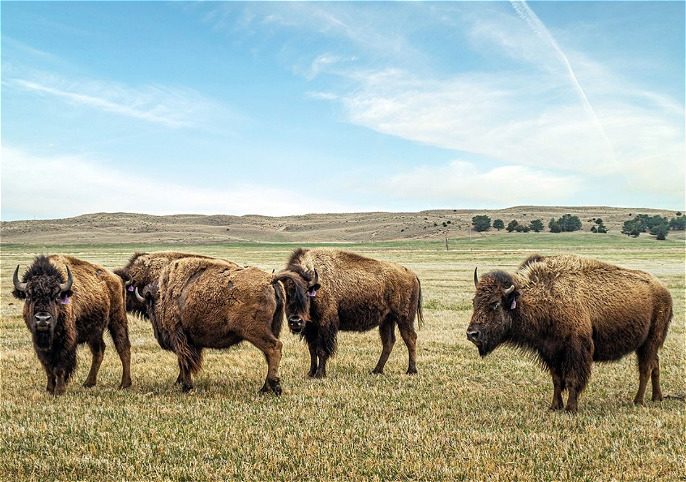Vanguard Partnership: Wild Idea Buffalo

When buffalo are allowed to move freely across the land, as they did for thousands of years, something almost magical occurs.
North America’s largest herbivore will feed on native grasses without overeating. Its hooves will move gently about the earth without damaging the soil essential to native grasses.
At Wild Idea Buffalo of Rapid City, the land and animal management practices honor that ancient relationship.
“Everything is done with such care, and there’s real people doing it, and they understand this is all bigger than us,” general manager Jillian Jones said.
For more than 25 years, this ranch has produced buffalo meat honoring their dignity at harvest. Buffalo are harvested only on the prairie where they graze. They never see the inside of a trailer or a feedlot, unlike 90 percent of buffalo raised for meat in the U.S.
“It feeds your soul,” Jones said.
Because of Wild Idea’s commitment to large-landscape grazing and a humane field harvest, its buffalo are never fed grain or given antibiotics or hormones. Their entire lives, they know only the openness of the plains and the taste of prairie grasses free of GMOs, herbicides and pesticides.
And because they never experience the stress of transport and confinement, their meat is unaffected by a surge of stress hormones.
“It’s the purest form of agriculture, raising animals, that I can get in front of and support,” said Tim Meagher, chief operating office of Vanguard Hospitality.
So it was only natural that Wild Idea Buffalo and its regenerative ag and ranching practices formed the cornerstone of Vanguard’s ongoing commitment to working regularly with local producers.
“For us, it’s the pinnacle of what we’re trying to support and continually moving to in our decision-making,” Meagher said.
Vanguard offers diners a variety of dishes using Wild Idea Buffalo, including the ribeye on the menu at Morrie’s Steakhouse.
“We’re really excited about our partnership with Vanguard,” Jones said.
“I think our relationship is really special because they understand the importance of making the connection and relationship with farmers and producers and making sure the customer knows what they’re putting in their mouth and spending money on. That’s something we’ve lost as a culture and society. We’ve had that disconnect for quite some time, and people are really hungry to build back those relationships.”
Come with us to the ranch for a closer look at the partnership:
